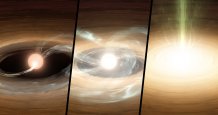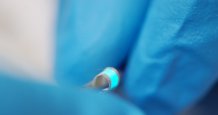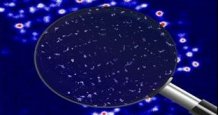News archive 2018

College hosts its 5th annual Christmas Lectures
On 19th December 2018 the College of Engineering, Mathematics and Physical Sciences hosted their 5th annual Christmas Lectures, arranged by Professor Pete Vukusic, Dr Gihan Marasingha, Dr Alice Mills and Vicky Glazer.

College hosts its 5th annual Christmas Lectures
On 19th December 2018 the College of Engineering, Mathematics and Physical Sciences hosted their 5th annual Christmas Lectures, arranged by Professor Pete Vukusic, Dr Gihan Marasingha, Dr Alice Mills and Vicky Glazer.

Newly discovered adolescent star seen undergoing ‘growth spurt’
Astronomers have discovered a young star undergoing a rare growth spurt – giving a fascinating glimpse into the development of these distant stellar objects.

Helium exoplanet inflated like a balloon, research shows
Astronomers have discovered a distant planet with an abundance of helium in its atmosphere, which has swollen to resemble an inflated balloon.

Newly discovered adolescent star seen undergoing ‘growth spurt’
Astronomers have discovered a young star undergoing a rare growth spurt – giving a fascinating glimpse into the development of these distant stellar objects.

Graphene unlocks new potential for ‘smart textiles’
The quest to create affordable, durable and mass-produced ‘smart textiles’ has been given fresh impetus through the use of the wonder material Graphene.

Exeter professor conferred as Honorary Fellow of Institute of Physics
Professor Roy Sambles has been made an Honorary Fellow of the Institute of Physics – the highest honour the organisation can confer.

Helium exoplanet inflated like a balloon, research shows
Astronomers have discovered a distant planet with an abundance of helium in its atmosphere, which has swollen to resemble an inflated balloon.

Graphene unlocks new potential for ‘smart textiles’
The quest to create affordable, durable and mass-produced ‘smart textiles’ has been given fresh impetus through the use of the wonder material Graphene.

Rising stars of research at Exeter receive prestigious European Research Council funding
Three rising research stars at the University of Exeter have received a significant funding boost from the European Research Council (ERC), it has been announced.

Exeter professor conferred as Honorary Fellow of Institute of Physics
Professor Roy Sambles has been made an Honorary Fellow of the Institute of Physics – the highest honour the organisation can confer.

Rising stars of research at Exeter receive prestigious European Research Council funding
Three rising research stars at the University of Exeter have received a significant funding boost from the European Research Council (ERC), it has been announced.

Scientists use ‘funnel-vision’ to pioneer cheap and efficient solar energy
Scientists have developed a pioneering new technique that could unlock new methods of making solar energy more efficient.

Scientists use ‘funnel-vision’ to pioneer cheap and efficient solar energy
Scientists have developed a pioneering new technique that could unlock new methods of making solar energy more efficient.

Shadow of a clear sky - astronomers find an exoplanet atmosphere free of clouds
Scientists have detected an exoplanet atmosphere that is free of clouds, marking a pivotal breakthrough in the quest for greater understanding

Shadow of a clear sky - astronomers find an exoplanet atmosphere free of clouds
Scientists have detected an exoplanet atmosphere that is free of clouds, marking a pivotal breakthrough in the quest for greater understanding

Helium detected in Exoplanet atmosphere for the first time
Astronomers have detected helium in the atmosphere of a planet that orbits a star far beyond our solar system for the very first time.

Stunning virtual tour of exoplanets takes its one millionth ‘passenger’.
One million budding astronomers and space enthusiasts have taken a magical tour to explore the exotic worlds orbiting distant stars, through a stunning virtual reality documentary.

Helium detected in Exoplanet atmosphere for the first time
Astronomers have detected helium in the atmosphere of a planet that orbits a star far beyond our solar system for the very first time.

Fossil study sheds light on ancient butterfly wing colours
Pioneering new research has given an illuminating new insight into the metallic, iridescent colours found on the earliest known ancestors of moths and butterflies, which habited the earth almost 200 million years ago.

When sound waves do the twist – backwards!
Scientists have demonstrated for the first time how ‘twisted’ sound waves from a rotating source can produce negative frequencies - akin to turning back time.

Exoplanet atmosphere observed in more detail than ever before
An international team of scientists has used the NASA/ESA Hubble Space Telescope to study the atmosphere of the hot exoplanet WASP-39b.

Hubble Probes Atmospheres of Exoplanets in TRAPPIST-1 Habitable Zone
Scientists have made the first steps towards understanding what makes up the atmospheres of several Earth-sized exoplanets orbiting the red dwarf star TRAPPIST-1.

Stunning virtual tour of exoplanets takes its one millionth ‘passenger’.
One million budding astronomers and space enthusiasts have taken a magical tour to explore the exotic worlds orbiting distant stars, through a stunning virtual reality documentary.

Physics and Astronomy department awarded IOP 'Juno Champion' status
The Department of Physics and Astronomy has been named a champion of gender equality as part of the Institute of Physics' Project Juno initiative.

Quest to advance towards next generation of computing takes quantum leap
The quest to understand a variety of intriguing phenomena that may advance progress towards the next generation of computing has taken a quantum leap.

Exeter receives EPSRC grant to revolutionise detection and treatment of life-threatening illnesses
The University of Exeter has received a multi-million pound research grant to lead pioneering new research to develop vastly more accurate procedures to detect, identify and treat life-threatening diseases, such as cancer.

Fossil study sheds light on ancient butterfly wing colours
Pioneering new research has given an illuminating new insight into the metallic, iridescent colours found on the earliest known ancestors of moths and butterflies, which habited the earth almost 200 million years ago.

Pioneering new technique could boost understanding of causes of heart disease
The complex and mysterious mechanisms that drive communication and reactions within human cells could be on the verge of being unravelled, due to a pioneering new technique.

When sound waves do the twist – backwards!
Scientists have demonstrated for the first time how ‘twisted’ sound waves from a rotating source can produce negative frequencies - akin to turning back time.

Exoplanet atmosphere observed in more detail than ever before
An international team of scientists has used the NASA/ESA Hubble Space Telescope to study the atmosphere of the hot exoplanet WASP-39b.

Hubble Probes Atmospheres of Exoplanets in TRAPPIST-1 Habitable Zone
Scientists have made the first steps towards understanding what makes up the atmospheres of several Earth-sized exoplanets orbiting the red dwarf star TRAPPIST-1.

Physics and Astronomy department awarded IOP 'Juno Champion' status
The Department of Physics and Astronomy has been named a champion of gender equality as part of the Institute of Physics' Project Juno initiative.

Quest to advance towards next generation of computing takes quantum leap
The quest to understand a variety of intriguing phenomena that may advance progress towards the next generation of computing has taken a quantum leap.

Exeter receives EPSRC grant to revolutionise detection and treatment of life-threatening illnesses
The University of Exeter has received a multi-million pound research grant to lead pioneering new research to develop vastly more accurate procedures to detect, identify and treat life-threatening diseases, such as cancer.

Pioneering new technique could boost understanding of causes of heart disease
The complex and mysterious mechanisms that drive communication and reactions within human cells could be on the verge of being unravelled, due to a pioneering new technique.
